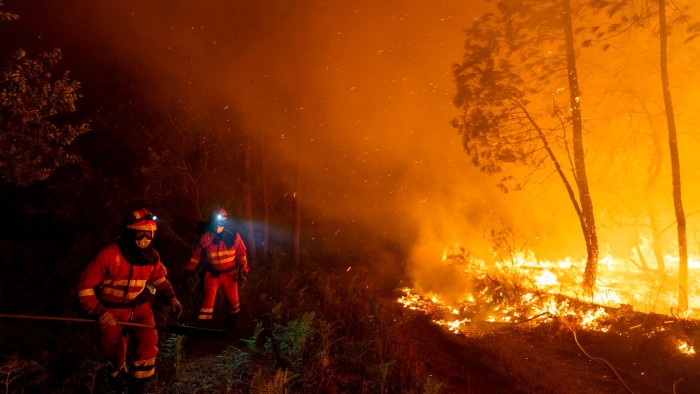Unlock the Editor’s Digest for free
Roula Khalaf, Editor of the FT, selects her favourite stories in this weekly newsletter.
Wildfires in Spain spanning a burnt area twice the size of London will trigger disaster declarations for the worst affected regions, its prime minister said, clearing the way for funding for aid and reconstruction.
Blazes continued to be fought in the north-western and south-western regions of the Iberian peninsula on Tuesday, despite a cooling of the heatwave which began more than two weeks ago.
Firefighting units from Germany arrived in northern Spain to join several other EU national forces helping to fight the blazes, the interior ministry said.
Spain’s Prime Minister Pedro Sánchez said there were “still critical moments ahead”. “Let us not be overconfident . . . there are still difficult hours.”
He said that once the fires were extinguished his government would assess the economic impact and activate the disaster mechanism, which he expected to take place by next Tuesday.
Climate change had exacerbated extreme weather events, he said, proposing a “state pact” involving science, business, state and local institutions in shaping a collective response to the “climate emergency”.
“Science tells us so, and common sense tells us so as well, especially that of farmers and . . . those who live in rural areas, that the climate is changing, that the climate emergency is worsening, that it is becoming more recurrent, more frequent, and each time has a greater impact.”
A group of residents cursed and shouted at Sánchez as he departed Zamora on Tuesday, media videos showed, angry at what they believed to be the slow government response. Spain had called on EU forces for help for the first time after its own capabilities were overwhelmed last week.
The north-western provinces including Zamora and León, Galicia’s Ourense province, and Cáceres in the south-western region of Extremadura have been surrounded by fires for more than a week.
The Spanish army has deployed about 2,000 troops to help firefighters, and four people have died, while thousands of residents were evacuated.
Transport links including the Galicia-Madrid train line were interrupted, and many roads were closed. A stretch of the Camino de Santiago pilgrimage walking route was also blocked.
Spain’s weather agency said the heatwave was the third longest on record. The fires have burned more than 382,000 hectares, according to the European Forest Fire Information System, or about twice metropolitan London.
Across Europe this summer, fires including those in Greece, Turkey and several Balkan countries have burned more land than in any year since 2006, according to agency estimates.
Graphics by Steven Bernard
Climate Capital
Where climate change meets business, markets and politics. Explore the FT’s coverage here.
Are you curious about the FT’s environmental sustainability commitments? Find out more about our science-based targets here

